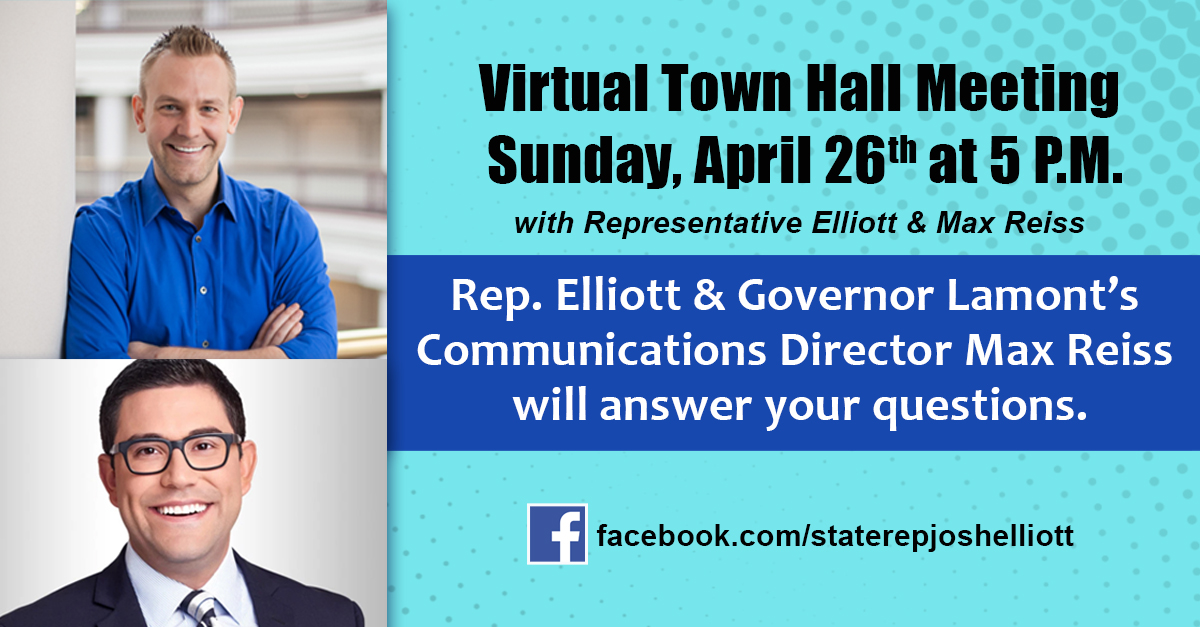|
Data updates on testing in Connecticut
A county-by-county breakdown includes:
| County |
Laboratory-Confirmed Cases |
Hospitalizations |
Deaths |
| Fairfield County |
9,883 |
749 |
584 |
| Hartford County |
4,128 |
495 |
442 |
| Litchfield County |
722 |
20 |
63 |
| Middlesex County |
525 |
42 |
53 |
| New Haven County |
5,811 |
620 |
345 |
| New London County |
397 |
32 |
14 |
| Tolland County |
331 |
11 |
32 |
| Windham County |
122 |
3 |
4 |
| Pending address validation |
550 |
0 |
7 |
| Total |
22,469 |
1,972 |
1,544 |
For several additional graphs and tables containing more data, including a list of cases in every municipality, click here.
Governor Lamont signs 31st executive order to mitigate the spread of COVID-19
Governor Lamont today signed another executive order – the 31st since he enacted the emergency declarations – that builds upon his efforts to encourage mitigation strategies that slow down transmission of the virus. Executive Order No. 7DD enacts the following provisions:
- Additions to the definition of telehealth provider: Modifies state statutes to add any licensed dentist, behavioral analyst, genetic counselor, music therapist, art therapist, and veterinarian to the definition of telehealth provider.
- Flexibility for Medicaid-enrolled providers and in-network providers for commercial fully insured health insurance to perform telehealth through additional methods: Modifies Section 5 of Executive Order No. 7G regarding the delivery of telehealth with an updated definition and requirements for telehealth.
- Additions to permissible out-of-state healthcare providers: Modifies state statutes to additionally allow the commissioner of the Department of Public Health to issue an order to suspend, for a period not to exceed sixty consecutive days, the requirements for licensure, certification, or registration for occupational therapists; alcohol and drug counselors; radiographers, radiologic technologists, radiologist assistants, and nuclear medicine technologists; dentists; dental hygienists; behavioral analysts; genetic counselors; music therapists; art therapists; dietician-nutritionists; and speech and language pathologists.
- Participation in intern, resident physician, or United States Medical Officer candidate training programs prior to permit issuance: Modifies state statutes to allow a person to participate in an intern or resident physician program or United States Medical officer candidate training program prior to issuance of a permit by the Department of Public Health provided that the hospital administrator documents that the person has satisfied the requirements for such a permit set forth in the statute.
- Participation in resident physician assistant program prior to permit issuance: Modifies state statutes to allow a person to participate in a resident physician assistant program in a short-term hospital that provides a postgraduate medical education program accredited by the Accreditation Council for Graduate Medical Education, without a license or temporary permit or a training permit issued by the Department of Public Health, provided that the hospital administrator documents that the person is to be appointed a resident physician assistant in such hospital and has satisfied certain requirements.
- Temporary suspension of physician assistant supervision restrictions: Modifies state statutes to suspend the supervision requirements for physician assistants authorized to practice in the State of Connecticut.
- Temporary suspension of in-person supervision requirement for advanced practice registered nurses: Modifies state statutes to suspend the requirement that a physician, medically directing the prescriptive activity of an advanced practice registered nurse who is prescribing and administering medical therapeutics during surgery, must be physically present in the institution, clinic, or other setting where the surgery is being performed.
- Provision of services by respiratory care therapist and respiratory care technician students: Modifies state statutes to allow a respiratory care therapist student or a respiratory care technician student to provide services except that the services are not required to be a component of such person’s course of study.
- Suspension of continuing education requirement for health care providers: Suspends certain continuing education requirements for one year for occupations and professions with annual education requirements, and for other occupations and professions the continuing education completion period and reporting requirements are suspended for six months.
- Modification of 36-month age limit for Birth-to-Three services: Modifies state statutes to authorize the commissioner of the Office of Early Childhood to temporarily expand the definition of “eligible children” to include children who are receiving Birth-to-Three intervention services but reach the age where they would no longer be eligible.
|












